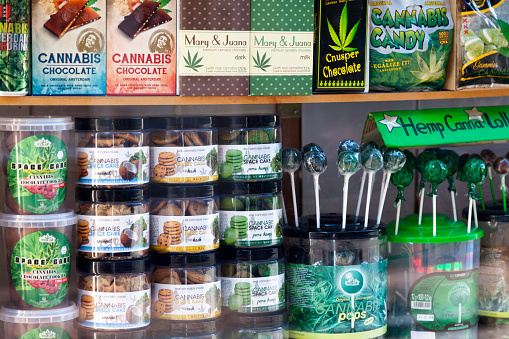
U.S, April 17, 2020 (MARIJUANABUSINESSDAILY) Marijuana retail businesses in markets that depend on travelers and tourism for at least a portion of their sales are being forced to pivot in response to the coronavirus pandemic in part by appealing more to local customers.
Stay-at-home orders in U.S. states have pushed marijuana company executives to rethink business strategies that appeal to tourists, particularly in the event the health scare persists into the summer, when the majority of cannabis sales to travelers happens.
Marijuana markets such as Nevada, where Las Vegas receives more than 40 million visitors a year, and Massachusetts, where droves of tourists from the East Coast head to Cape Cod each summer, would be severely impacted by a prolonged shutdown of tourism.
Several other states with legal markets and strong tourism industries, including Alaska, Colorado and Florida, could also experience similar negative fallout.
To stay afloat during these difficult circumstances, marijuana retailers in tourism-heavy markets are:
- Focusing on regular customers within their communities by offering discounts and incentives such as loyalty programs.
- Pumping more resources into building out alternative sales strategies such as delivery and online ordering.
- Working on brand awareness among locals, not tourists, to compete for nearby customers.
“We want to handle this the right way so after this pandemic subsides we can keep those customers forever,” said David Farris, vice president of sales and marketing for vertically integrated Las Vegas-based cannabis company Planet 13.
Capturing local market share
In the Nevada marijuana market, which is primarily centered on tourism-reliant Las Vegas, regulators have required recreational cannabis stores to operate as delivery-only during the global outbreak.
Before the pandemic, Farris said, about 80% of Planet 13’s store traffic came from tourism.
“Now it’s 100% a local market,” he said.
Farris said the state gave his company about six hours to pivot and adjust to the delivery-only rule.
The business decided to use the opportunity to build out its fleet of delivery vehicles.
“We’ve ramped up our delivery service from five to 28 vehicles,” Larry Scheffler, co-CEO of Plant 13, said in a news release.
“While tourism will continue to be a strong driver of our business when things return to normal, this is a unique opportunity for us to build a strong local base and gain lasting market share.”
Local customers prefer flower, and they’re also more knowledgeable about “which brands make quality products and which don’t” in the Las Vegas market, according to Farris.
“We’ve really pivoted and understood what that local customer is looking for,” he added.
To assist shoppers, the business constantly updates inventory on its online ordering system, down to the THC content of the product.
The company also rolls out the red carpet by way of customer support.
Any customer with a Nevada driver’s license receives a 20% discount.
Planet 13 also tries to offer discount options for those locals who might be out of work.
“During these trying times it’s really important for us to offer a value product,” Farris said.
Pivot to medical
Tim Shaw, chief operating officer of multistate cannabis operator MariMed, headquartered in Norwood, Massachusetts, said his company has been able to pivot by catering to medical marijuana patients.
Adult-use marijuana sales are banned in Massachusetts during the pandemic, but the state’s Cannabis Control Commission reports an increase of 158% in new MMJ patients week-over-week since the rec program was shut down by Gov. Charlie Baker on March 24.
Shaw said he’s seeing an average of 15 new patients visit his stores each day.
“We’re getting more and more medical marijuana visitors than we were getting before,” he added.
While the increase in customers with MMJ cards is good for sales, Shaw anticipates a major decline in business as the weather gets nicer.
Two of the company’s retail stores are situated near Interstate 495, which leads to popular vacation destination Cape Cod, and Shaw said projections will be tough to meet if the beaches remain closed into the summer.
But he advised that it’s too early to tell what could happen to businesses that rely on warm-weather tourism.
“We’re on an uptick still,” Shaw said.
Airport traffic and cannatourism
In Colorado, some retailers have scaled back hours at their locations in mountain resort towns, which were dealt an economic setback after Gov. Jared Polis ordered the state’s ski industry to close in mid-March.
Other stores located to capture traveler traffic – including those coming from Denver International Airport – have seen their customer base shrink.
Seed & Smith, a vertically integrated cannabis company in Denver, built a part of its business around its proximity to the airport and capturing that traffic.
The company offers full-scale tours of its store and grow facilities, including curious travelers who might be from a state without a legal cannabis program.
For example, visitors can hold a pound of flower and feel the weight of it, something most people never experience.
“It’s a real big draw for people coming from illegal states,” said Robbie Wroblewski, Seed & Smith’s director of community outreach. “We’re not going to be seeing that traffic for a while.”
The tours, however, have been shut down indefinitely.
To keep the company’s educational outreach going, its website has been updated with frequently asked questions and other information about cannabis.
Seed & Smith also has increased its social media outreach to help push customers to the website.
Earlier in April, Colorado made online sales of recreational marijuana legal during the coronavirus pandemic.
Businesses that overly rely on tourists might have been leaning too heavily on that market, said Peter Marcus, communications director for cannabis company Terrapin Care Station, which has six stores in Colorado.
He pointed out that while overall tourism numbers might decline, the amount of cannatourism to Colorado has plateaued in recent years.
“If you’ve been relying on tourism, you’re in trouble,” Marcus said. “But if you’ve had a more diverse customer base, then it’s something else that can be weathered during this storm.”






